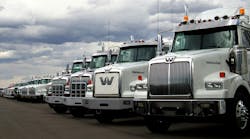In his proposed budget presented yesterday, among the many programs President Barack Obama has proposed eliminating is the Diesel Emissions Reduction Act (DERA) grant program, administered through the Environmental Protection Agency.
The Administration also argues that the program has “largely succeeded” but because the program “retrofits and replaces newer engines, its cost effectiveness decreases, because the same amount of grant funding results in less substantial emissions reductions.”
(There are other transportation-related cuts proposed in the President's entire budget. You can read it here)
When the new diesel emissions regulations went into effect in 2007, and then were tightened in 2010, there is no doubt that newer engines have significantly cleaned the air. But these 2007 and newer diesel engines account for less than half of all diesel engines on the road today.
There are approximately 8 million commercial trucks on the road today, with an average fleet age approaching 6.7 years, meaning there are likely some 4 million commercial vehicles traveling roads today that pre-date the 2007 engine emissions requirements – and that number may be higher since used-truck owners are turning over their vehicles significantly less frequently than fleets. How many people are still running 10, 15, or even 20 year-old vehicles? Quite a few.
Martin Daum, president & CEO of Daimler Trucks North America, told Fleet Owner last fall that there is a “clear trend to 5-year/500,000-mi. trade cycles now.”
Since 2008, $469 million dollars has been appropriated by Congress under DERA. EPA reported that in 2008 alone, 14,000 vehicles were retrofitted. Interestingly, Obama just signed a reauthorization of the DERA program on Jan. 4, a program that was approved by both the House and Senate in December. It provides for $100 million a year for five years for diesel retrofits.
If we take that 2008 retrofit figure and calculate that out five more years, that means an additional 70,000 vehicles can be retrofitted to run cleaner. EPA estimates 46,000 tons of NOx and 2,200 tons of particulate matter were eliminated in 2008 due to the program. Those numbers would jump to 230,000 tons of NOx and 11,000 tons of particulate matter over the next five years. And that doesn’t include factor in older vehicles that are mothballed in favor of newer technology.
While the Administration can assume that the simple replacement cycle of vehicles will clean the air sufficiently, it throws the funding burden for these types of programs back into the laps of state governments.
We simply can’t do that.





